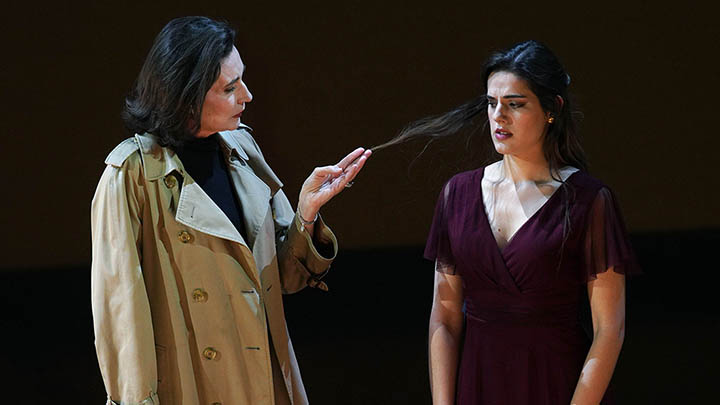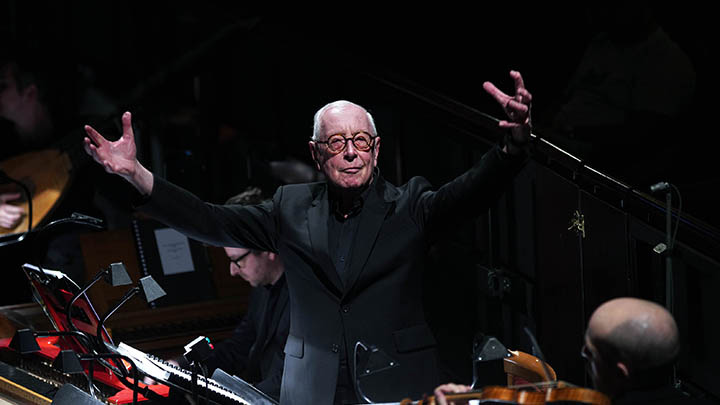Marc-Antoine Charpentier’s lyric tragedy Médée secured its place in the modern repertoire due to the artistry and scholarship of William Christie, who championed the composer’s music during his early years with his ensemble Les Arts Florissants. Christie’s groundbreaking concerts, staged performances, and studio recordings of Médée from the 1980s and 1990s were instrumental in unveiling Charpentier’s craftsmanship for sculpting psychologically multifaceted characters and orchestrating intensely expressive theatrical music. Despite its score’s aesthetic being tied to the technological means of the 17th century, Charpentier and Thomas Corneille were remarkably prescient as dramatists in conceiving a work that exuded the same organic melodic language and verbal potency visible in operatic masterworks of the late 19th and early 20th centuries.
Christie’s pair of Médée recordings represented landmark documents of rediscovery for Charpentier’s masterpiece. His 1984 account, which closely followed concert performances starring Jill Feldman and Gilles Ragon, was a historic milestone that lifted the opera out of obscurity. A decade later, Christie’s collaboration with the director Jean-Marie Villégier in their richly detailed stage production gave the opera its definitive recording—an engrossing, note-complete affair distinguished by the brilliant Lorraine Hunt Lieberson’s charismatic portrayal of the lead role.
Nearly thirty years after those seminal performances, Christie and Les Arts Florissants once again revisited Médée in its entirety during a season that has been transformative for Charpentier’s work. Last winter, Christopher Corwin praised Sir Simon Rattle’s riveting collaboration with Magdalena Kozená and Peter Sellars in Berlin, while parterre box spotlighted Hervé Niquet and Véronique Gens‘s new complete studio recording on Alpha Classics when it released in early 2024.
Earlier this spring, William Christie and Les Arts Florissants achieved the important historic milestone of finally presenting Médée in its long-awaited premiere at the Paris Opera. The Garnier’s Médée, previously staged by David McVicar for the English National Opera, was televised by ArteTV and features an idiomatic cast of French baroque specialists like Lea Desandre, Reinoud Van Mechelen, Ana Vieira Leite, and Laurent Naouri. After helming its historic Paris Opera premiere, Christie and his orchestra then transported Charpentier’s masterwork work to Madrid, where Véronique Gens limned a most captivating portrayal of the titular sorceress under Marie Lambert le Bihan’s semi-staged concept. The Teatro Real’s prima on June 6 serves as the focal point of this review.
Paris and Madrid’s performances fascinate for distilling the artistic ideas that Christie accrued over four decades of championing his beloved masterpiece. To accommodate its runtime within a timeframe of approximately 3 hours, both productions eschew the Louis XIV-oriented prologue. On matters of developing the score’s dramatic architecture, Christie’s reading is closer in its psychological buildup to his second recording from 1994. However, in the intervening thirty years, the conductor’s vision has evolved, allowing the tragic scenes to unfold with greater depth and gravitas, while the orchestra exhibits nonpareil refinement in its execution. The third act, arguably the most theatrically awe-inspiring piece of music within Charpentier’s oeuvre, rumbles and thunders with a full palette of dynamics and tonal shades that couldn’t be fully experienced within the confines of a recording.
Witnessing William Christie guide his orchestra and singers was truly one of this performance’s greatest highlights. The conductor’s graceful gestures evinced love for the score, his hands’ supple and expressive motions resonant with the story’s progression and emotional contours. While his recordings of Médée offer glimpses of Charpentier’s genius, the full ensemble’s live performance radiates with musical brilliance, delineating the score’s fascinating harmonies and the myriad details behind the composer’s melodic transformations. Most memorably, Christie and Les Arts Florissants brought to life the profound grief that suffuses Médée’s great scene in Act III. As scenic painters, the orchestra’s players were masters in imbuing Lake Avernus’s thunderous cataclysms with a visceral intensity and the phantasms Médée unleashes upon Creon with an otherworldly eroticism.
Nevertheless, it was Véronique Gens’s mesmerizing incarnation of Médée that reaped the greatest rewards from Christie’s profound identification with the score. Gens personified the quintessential tragedienne, wielding her artistic prowess with authority. Liberated from the strictures of concert opera, she exhibited a sovereign command of phrasing and an incisive dramatic acumen that enthralled the audience whenever her character dominated the stage. Guided by Christie’s taste and insight, Gens’s Madrid performance transcended the recorded interpretation she minted with Niquet and equals or even eclipses aspects of Lorraine Hunt’s groundbreaking interpretation.
Gens, who was in radiant vocal form for the premiere at the Teatro Real, deployed her impeccable diction and aristocratic poise while engaging Créon and Corinth’s aristocratic class. Her intelligent phrasing significantly enlivened her political interactions, alluding to the character’s adeptness in leveraging power dynamics to her advantage. Yet it was in Médée’s soliloquy that Gens found the apogee of her reading, with her profoundly tragic rendition of “Quel Prix de Mon Amour” unfolding with a more profound sense of heartbreak compared to that heard previously. The diabolical summons that followed revealed an unfettered enchantress capable of unleashing destruction upon the world, her phrasing anguished and terrifying in its potency.
The Belgian haute-contre Reinoud Van Mechelen, recently cast as Jason in the Paris production with Christie, possesses a darker, more metallic timbre compared to his lyrical and mellifluous counterparts in the discography. Van Mechelen’s stylish musicality and muscular vocalism add depth to his portrayal of Jason, a morally dubious and opportunistic warrior whose actions catalyze the libretto’s tragic events. Ana Vieira Leite, another returning performer from Paris, reprises her role as Creuse in Madrid, her jewel-toned and youthful interpretation contrasting fascinatingly with Gens’ regal and imposing presence.
Although Cyril Costanzo’s Créon and Marc Mauillon’s Oronte lack the firm vocalism or commanding presence of Laurent Naouri and Gordon Bintner in the Paris production, Costanzo’s haunting and demented portrayal of the mad scene in Act IV leaves an indelible impression. Emmanuelle de Negri, a seasoned LAF singer celebrated for her exquisite Sangaride (Atys, 2011), delivers an unusually engaged and inviting Nérine, her scenes with Gens a highlight that effectively drew audiences into Médée’s troubled psyche.
Marie-Lambert le Bihan’s meticulous personenregie and her subtle use of minimalist props and lighting stood as the hallmarks of her production’s theatrical direction. Under her guidance, the soloists’ and chorists’ movements were thoughtfully choreographed to highlight the rich subtleties of Corneille and Charpentier’s creation. This masterful character direction was most evident in Le Bihan’s collaboration with Véronique Gens, whose performance from the third act onward consistently radiated dramatic tension.
However, there were moments when the absence of more elaborate visual elements caused Charpentier’s chorus-heavy scenes to lose distinction and character, prompting one to question why a more visually engaging production like that of the late Villegier’s couldn’t have been chosen as le Bihan’s dramaturgical backdrop for this important Spanish premiere. Despite these minor misgivings, the evening was ultimately an artistic triumph for the Teatro Real, Charpentier, William Christie and above all, Véronique Gens and her definitive Médée.
Photos: Javier Del Real






